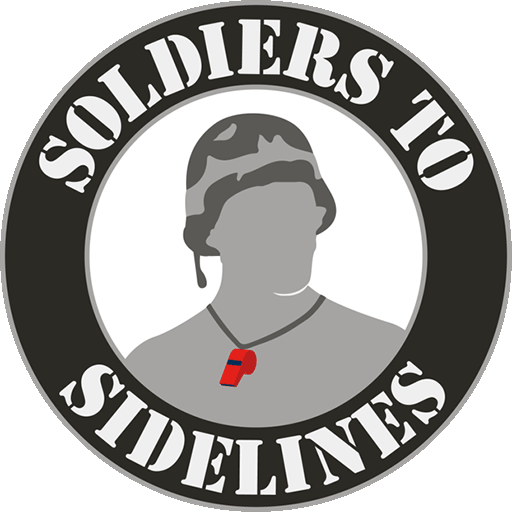This April, over 200 motivated coaches gathered virtually for the Soldiers To Sidelines Sports Performance Seminar, a weeklong, high-impact certification event designed to build stronger coaches, leaders, and communities. Proudly presented by our partner and sponsor, the Wounded Warrior Project, this seminar empowered current and aspiring coaches — many of them veterans — with a comprehensive and holistic look at what it means to lead through sports.
Thanks to the generous support of contributing sponsors Wells Fargo and TeamBuildr, the seminar was offered free of charge to our military and veteran community. Their continued commitment plays a vital role in making this opportunity accessible to those who’ve served and are now stepping up to serve in new ways — on the sidelines.
A Whistle Worth Earning: Kicking Off with Purpose
The seminar opened with remarks from Harrison Bernstein, founder and executive director of Soldiers To Sidelines. Harrison welcomed participants into a culture of commitment, explaining that certification required full participation, completed assignments, and active engagement. But more than that, he introduced a mindset: earning your whistle every single day through integrity, effort, and selfless service.
The week’s keynote was delivered by the incomparable Martin Rooney, creator of the Training for Warriors system. With energy, humor, and hard-won wisdom, Martin challenged coaches to define their “why” and find a niche that ignites their passion. Drawing on his own journey from physical therapy to elite performance coaching, Martin’s core message was clear: Coaching is a calling — one that demands relentless perseverance and heart.
The Foundation of Performance: From Philosophy to Frameworks
In the first session, Johanna Zabal, Director of Sports Performance, laid the groundwork for the week. Her comprehensive framework introduced essential pillars of performance — strength, conditioning, speed, mobility, nutrition, sleep, and hygiene. This systems-based view encouraged coaches to think beyond sets and reps, understanding that an athlete’s performance is shaped by everything from training cycles to recovery habits.
Harrison further explored the differences between coaching, leadership, and management, illustrating them with a powerful inverted pyramid. At its foundation? Inspiration. Above it: motivation, fitness, technique, and strategy. Coaches, he argued, must lead with heart first — then apply the science.
Finding the “Why”: Motivation, Inspiration, and Purpose
Throughout the seminar, Harrison returned to the importance of purpose-driven coaching. Using the movie Miracle as a touchstone, he urged coaches to dig deep into their own “why” — and help their athletes do the same. He introduced the SURF model (Safety, Energy, Retention, Fun), encouraging coaches to foster environments where athletes feel seen, heard, and excited to grow.
A key message? Everyone is already motivated. It’s a coach’s job to unlock and direct that motivation — and it starts with connection, autonomy, and competence.
Fueling Performance: Nutrition and Supplements
Christina Schreckengauss, U.S. Navy Commander and performance nutrition expert, led the second session with a deep dive into athletic nutrition. She covered macronutrients, hydration, nutrient timing, and the role of food in performance, recovery, and injury prevention. Her practical, science-backed approach helped coaches understand how to support athletes before, during, and after competition.
She also addressed the complex world of supplementation, warning against products with vague proprietary blends and recommending third-party tested essentials like creatine, vitamin D, and omega-3s. Christina’s military perspective added valuable context to supplement usage in high-performance and high-stress environments.
Later, Annette Zap, a retired firefighter and PhD candidate, tackled common myths about creatine, reaffirming its safety and benefits for both athletic and cognitive performance. Her insights reminded coaches that evidence-based supplementation can be a powerful tool — especially when paired with proper nutrition.
Movement Mastery: Deadlifts, Cues, and Core Control
In session three, Johanna led a detailed look into core stabilization and exercise execution. From intra-abdominal pressure to planes of motion, coaches learned how to teach and cue foundational lifts like the squat and deadlift with precision. Christopher and Ricky, contributing coaches, broke down proper deadlift mechanics, while Aaron highlighted common errors during demos.
The group also explored the seven components of an effective drill, practiced queuing techniques, and discussed the difference between external (outcome) and internal (process) cues. Safety and athlete understanding were front and center, as was the power of concise, intentional language.
Johanna then introduced periodization, helping coaches structure macro, meso, and micro training cycles aligned with athletic goals. She emphasized the importance of recovery, sleep, and smart load management — especially for older athletes or those returning from injury.
Tech Tools in Coaching: Hands-On with TeamBuildr
The final session featured a robust tutorial of TeamBuildr, an innovative online programming platform that allows coaches to build and deliver custom workouts. Led by Melissa Mercado, the demo walked attendees through features like:
- Adding warm-ups, resistance training, and recovery work
- Tracking athlete readiness and performance
- Exporting PDFs and utilizing mobile and tablet views
- Creating circuits and questionnaires
- Adjusting plans based on athlete feedback
Coaches then entered breakout rooms to create custom programs for sports like hockey and football, with varying training phases. The process emphasized individualization, adaptation, and real-time feedback — core skills for any great coach.
Melissa also answered questions about RPE-based programming, load adjustments, and bulk uploading athletes. TeamBuildr even extended full access for an additional two months, giving coaches the chance to apply their new knowledge with confidence.
One Team, One Mission
By the end of the seminar, participants had gained far more than a certificate. They walked away with a deeper understanding of coaching science, a renewed sense of purpose, and the support of a growing community of like-minded leaders. Whether working with youth, collegiate, or professional athletes, the coaches left prepared to make an impact on and off the field.
Once again, a huge thank you to Wounded Warrior Project for presenting this transformational seminar, and to our supporting sponsors Wells Fargo and TeamBuildr for helping make it possible.
For more information on future coaching certifications, in-person clinics, and professional development opportunities, visit SoldiersToSidelines.org.


Recent Comments